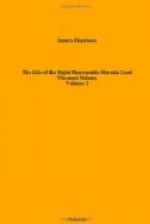all night in Gibraltar Gut. About four o’clock,
next morning, the Termagant joined, with an account
of the combined fleet’s having been seen, the
19th of June, by the Curieux brig, standing to the
northward. At eight, the Spaniards fired a few
shot, from Tariffa, at the Victory; which, however,
took no effect. At noon, they saw Admiral Collingwood’s
squadron; and Lord Nelson sent letters to the admiral,
with arrangements for preventing the combined fleet
from entering Cadiz, while his lordship proceeded to
seek them nearer home. On the 26th, the Spartiate
got on board the Victory; but, fortunately, neither
ship suffered any material damage. Having traversed
the Bay of Biscay, without discovering any thing of
the enemy, his lordship, on the 28th, at day-light,
came abreast of Cape St. Vincent; from whence, with
faint hopes of finding them, he pursued his northerly
course toward the north-west of Ireland, By foul winds,
and very unfavourable weather, this proved a most
tediously vexatious voyage. Unable, after all,
to fetch Ireland, on account of the northerly winds,
his lordship, in the afternoon of August 12, was informed
by the Niobe, Captain Scott, three weeks from the
channel fleet, that there had not, at that time, been
the smallest intelligence of the enemy’s arrival
in any of the ports. He also learned, that they
had not been heard of on the Irish coast. Having
exhausted every rational conjecture with regard to
their situation, he resolved on reinforcing Admiral
Cornwallis with his squadron; lest the combined fleet
of France and Spain should, by approaching Brest,
either facilitate the escape of the squadron so long
confined by this commander’s blockade of that
port, or place him aukwardly between two fires.
Accordingly, on the 15th, at six in the morning, Lord
Nelson got within eighteen leagues of Ushant; and,
at half past eleven, saw a fleet. At two in the
afternoon, they exchanged private signals with the
channel fleet; and, in the evening, his lordship,
having detached the rest of his fleet, received orders
from Admiral Cornwallis, as commander in chief, to
proceed with the Victory and Superb to Portsmouth.
His lordship now first gained information of Sir Robert
Calder’s having defeated the combined fleet
from the West Indies, on the 22d of July, sixty leagues
west of Cape Finisterre; which, at length, relieved
him from the anxiety of suspence, though the action
had been too indecisive compleatly to satisfy his
lordship’s mind. He regretted, exceedingly,
that it had not been his own good fortune to encounter
them; and felt less comforted, than he ought to have
done, by the consideration, that this squadron, under
Sir Robert Calder, had been sent out to intercept
their return, in consequence of his, lordship’s
suggestions, judiciously transmitted to the Admiralty
for that purpose, the moment he was satisfied that
the combined French and Spanish fleet were on their
return from the West Indies.




